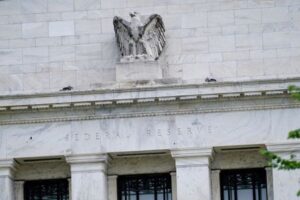By Maria Martinez
BERLIN (Reuters) -German inflation rose more than expected in June, interrupting a steady decline since the start of the year in what analysts say was just a blip.
German consumer prices, harmonised to compare with other European Union countries, rose by a higher-than-anticipated 6.8% on the year in June, preliminary data from the German statistics office showed on Thursday. Analysts had expected an increase of 6.7%.
By comparison, inflation fell sharply in Spain to 1.6% and to 6.7% in Italy. French and euro zone inflation data is due on Friday. Economists polled by Reuters expect euro zone inflation to fall to 5.6% in June from 6.1% in May.
“The June figures in Germany only interrupt the downward trend in the inflation rate and do not mark its end,” said Ralph Solveen, senior economist at Commerzbank.
Non-harmonized consumer prices rose 6.4% in June year-on-year, following a 6.1% rise in the previous month.
Compared to May, prices increased by 0.4% in EU-harmonized terms, the office added. Analysts had expected an increase of 0.3%.
The year-on-year rebound in German inflation midway through the second quarter is almost exclusively due to base effects from last year’s temporarily-reduced rail fare, said Claus Vistesen, chief eurozone economist at Pantheon Macroeconomics.
In June of last year, in a bid to counter rising energy prices, the German government cut taxes on fuel and introduced a public transport ticket allowing travel across the country for 9 euros a month, causing German inflation to dip that month.
A new subsidised travel ticket that covers all local public transport has replaced last summer’s ticket, but at 49 euros ($53) per month it is significantly more expensive.
The data from Germany, the euro zone’s biggest economy, comes as the European Central Bank is still looking for evidence that underlying inflation has turned a corner.
Germany’s core inflation rate, which excludes volatile items such as food and energy, is expected to be at 5.8% in June, up from 5.4% in May.
“However, a closer look at the data suggests that the disinflationary trend will gain new and even stronger momentum after the summer,” said Carsten Brzeski, global head of macro at ING.
Economists expect a decline in headline inflation over the summer, as energy and food inflation soften. However, the core rate will probably remain significantly above the ECB target of 2% for an extended period of time, Commerzbank’s Solveen said.
The ECB has lifted rates by a record 400 basis points over the past year and is forecast to raise rates in July and September.
“The ECB will not change its tightening stance until core inflation shows clear signs of a turning point and will continue hiking until then,” Brzeski said.
(Reporting by Maria Martinez, Editing by Friederike Heine, Miranda Murray, Angus MacSwan and Conor Humphries)





